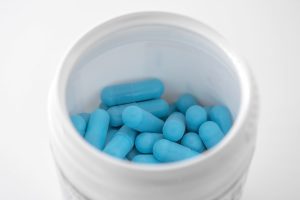Cranberry juice can be effective as a natural option to prevent or treat urinary tract infections. For decades, the cranberry juice UTI prevention option has been believed to be very effective for women. But is there any scientific proof to support this claim?
In this article, we’ll examine the research behind cranberry juice and UTIs and how much is safe enough for consumption to enjoy its antibacterial qualities.
Whether you’re prone to recurrent infections or simply interested in natural remedies, read on to learn more about the power of cranberry juice for your urinary health.
Does cranberry juice prevent urinary infections?
If you have a UTI, you may wonder if juice from cranberry can help. Well, the good news is that science says yes! Studies have shown that cranberries have antibacterial properties that prevent some bacteria from adhering to the bladder and urinary walls, stopping them from causing an infection.
Additionally, regularly consuming cranberry products like juice or supplements may reduce your risk of developing UTIs in the first place. However, it’s important to note that while drinking this juice is beneficial, it may not be a magic bullet for preventing all UTIs – especially those caused by antibiotic-resistant bacteria strains.
And as for dosage, most studies suggest aiming for at least 500 milligrams of concentrated cranberry extract per day for maximum benefits. So next time you’re looking for a natural way to keep your urinary system healthy and happy, consider adding some tart cranberry goodness to your routine!
Are Cranberries Good for UTI Prevention?
If you’re looking for a natural option to prevent and cure UTIs, cranberry juice might be your answer. For years, it has been highly recommended as an effective means of preventing UTIs in women. While scientific evidence is inconclusive, studies have supported cranberry juice UTI treatment ability.
People should take unsweetened cranberry juice daily or at least twice weekly to enjoy its benefits. The quantity can vary depending on body weight and concentration of the juice.
While cranberry juice is effective against UTIs, it should not be depended on as a primary infection treatment. Instead, it can complement the treatment prescribed by your doctor.
How does cranberry juice UTI treatment work?
Cranberries contain proanthocyanidins that can prevent bacteria from sticking to the bladder wall and causing an infection.
This mechanism prevents bacterial growth and helps decrease inflammation, making it less challenging for your body to fight off the infection. But how much cranberry juice should you drink? Drinking about 8 ounces of pure unsweetened cranberry juice daily helps ward off UTIs.
However, if you find the taste too tart, you can opt for supplements or sweetened versions. While not as effective as pure cranberry juice, these options offer preventative benefits against UTIs.
If you’re prone to recurrent UTIs or just looking for a natural remedy, consider adding cranberry juice to your diet regimen today!
What is the best kind of cranberry juice for a UTI?
When choosing the best cranberry juice for a UTI, there are a few key factors to consider. First and foremost, you’ll want to opt for 100% pure cranberry juice or concentrate that doesn’t contain any added sugars or artificial flavors. This ensures you get the full range of benefits from the fruit without any unnecessary additives.
In addition, it’s essential to look for products with high levels of proanthocyanidins (PACs), compounds found in cranberries that have been shown to inhibit bacterial growth in the urinary system. Look for juices with at least 36 milligrams of PACs per serving for maximum effectiveness.
Finally, be mindful of your overall sugar intake when consuming cranberry juice – while natural sugar is okay in moderation, too much can worsen UTI symptoms by feeding bacteria in your system.
Stick to recommended serving sizes and balance your intake with plenty of water throughout the day for optimal results.
How much cranberry juice should I drink for a UTI?
The answer is more complex if you’re wondering how much cranberry juice you should drink for a UTI. Daily drinking 8-16 ounces of cranberry juice may help prevent urinary infections by stopping bacteria from sticking to the bladder walls.
However, it’s important to note that more than this amount may be required when treating an active infection. Additionally, cranberry juice does contain sugar and calories, so it’s crucial to consider these factors if you decide to add it to your diet.
Finally, if you have diabetes or other health concerns that require monitoring your sugar intake, speak with a healthcare provider before taking large amounts of cranberry juice.
Ultimately, individual requirements vary, and taking medical advice can better guide how much cranberry juice suits.
How long before cranberry juice UTI treatment starts working?
The time frame varies, depending on the severity of the infection and individual circumstances. Generally, you may see some improvement in your symptoms within 24 hours after drinking cranberry juice.
However, experts often note that while cranberry juice can help alleviate symptoms of UTI, it’s not a cure-all solution. Cranberries contain compounds that inhibit bacteria from sticking to the bladder wall, so they could help prevent recurrent infections but are unlikely to clear an existing one without antibiotics. This is why medical treatment should still be considered if symptoms persist or worsen.
It’s essential to speak with your doctor if you suspect you have a UTI, as prompt diagnosis and treatment can help avoid complications such as kidney damage or blood poisoning (sepsis).
What are the side effects of cranberry juice?
While cranberry juice is commonly considered a natural remedy for preventing and treating UTIs, it’s essential to understand that consuming too much can have adverse side effects. For example, the high sugar content in cranberry juice makes it unsuitable for people with diabetes or those following a low-sugar diet.
Additionally, drinking excessive amounts of cranberry juice may lead to stomach cramps, urinary incontinence, diarrhea, or bloating due to its acidity.
Furthermore, if you’re taking blood-thinning medications like warfarin or aspirin, be aware that cranberries contain salicylic acid, which can increase the risk of bleeding. While these side effects aren’t common and are generally mild when they occur, it’s still vital to be cautious.

What medications should not be taken with cranberry juice?
While cranberry juice is a popular home remedy for treating UTIs, it’s important to note that not all medications can be taken alongside this drink. For instance, antibiotics such as ciprofloxacin and tetracycline may interact with cranberry juice and reduce its effectiveness. Therefore, it’s best to consult your healthcare provider before starting any new medication while consuming cranberry juice.
Moreover, people on blood-thinning medication like warfarin should avoid drinking large amounts of cranberry juice as it contains high levels of vitamin K, which helps in blood clotting. This can cause issues with their medication dosage and potential bleeding risks.
Always seek professional advice from a licensed medical professional before starting a new treatment regimen.
Alternative prevention tips for UTIs you can try
In addition to cranberry juice, several other alternative methods can help prevent UTIs. One is to drink plenty of water throughout the day, which helps flush bacteria out of the urinary tract.
Another option is probiotics, which can restore bacterial balance in the gut and urinary tract. Additionally, avoiding irritants like tight-fitting clothing or harsh soaps around the genital area can reduce your risk of infection.
It’s also vital to practice good hygiene habits, such as cleaning from front to back after using the restroom and urinating after sexual activity. In addition, for people prone to recurrent infections, avoiding certain foods (like caffeine or spicy foods) and making lifestyle changes (such as smoking cessation) may help prevent future UTIs.
Incorporating these various prevention tips into your routine alongside cranberry juice consumption can significantly decrease your chances of experiencing a painful UTI.
Is it okay to drink cranberry juice while taking antibiotics?
If you’re taking antibiotics for a UTI and are wondering if it’s okay to drink cranberry juice, the answer is generally yes. Drinking cranberry juice helps prevent or reduce the severity of UTIs by preventing bacteria from adhering to the bladder wall. However, it’s important to note that this benefit is primarily seen in women with recurrent UTIs rather than those experiencing their first episode.
While there is no specific recommendation for how much cranberry juice one should drink while on antibiotics, most studies have shown about 8-16 ounces per day of unsweetened cranberry juice or a concentrated supplement equivalent.
It’s also important to know that sweetened juices or cocktails may not be as effective due to their high sugar content. As always, talk with your healthcare consultant before adding new supplements or dietary changes to your routine while taking antibiotics.
How many cranberry pills do I take a day for UTI?
The answer could be more straightforward if you wonder how many cranberry pills to take for UTI. It depends on the specific product and its dosage recommendations.
Some pills suggest taking one or two capsules daily, while others may require a higher intake for desired effects. Therefore, it’s essential to read labels carefully and follow instructions closely. In general, consuming cranberry in any form may help prevent UTIs by inhibiting bacteria from adhering to the bladder wall – but it may not necessarily cure an ongoing infection. If you are currently experiencing symptoms of a UTI, talk to your healthcare provider about treatment options before relying solely on cranberry supplements or juice as a remedy.
Remember that although natural remedies like cranberries can be beneficial in preventing and treating specific health conditions, they should never replace professional medical advice or prescribed treatments when necessary. So stay informed and consult your doctor if you have concerns about urinary tract infections or other health issues- they’re there to help!
What is the best time to drink cranberry juice?
To prevent or treat UTIs, the best time to drink cranberry juice is before meals. Studies have shown that consuming cranberry juice before a meal can help reduce bacteria in the urine by preventing them from sticking to the bladder walls.
When bacteria can’t stick, they’re more easily flushed out of the body through urination. It’s also important to note that drinking 100% pure cranberry juice is essential for maximum effectiveness – sugary and diluted juices will provide different benefits.
Aim for at least one glass (8 ounces) per day, but be sure not to overdo it, as excessive consumption can lead to digestive discomfort and potential side effects with certain medications.
Incorporating cranberry juice into your daily routine can lower your UTI risk and promote overall urinary health. So pour yourself a glass today – your bladder will thank you!
Read Also: A Comprehensive Guide on How to Get Rid of a UTI Quickly
Frequently Asked Questions (FAQs)
Cranberries contain proanthocyanidins that may stop bacteria from staying on the urinary tract walls, making it harder for an infection to take hold.
However, to consume enough of these properties to make a difference, you’d need to drink pure cranberry juice without added sugars or other fluids.
In addition to potentially preventing UTIs, cranberry juice can also help treat them once they occur. Since it’s packed with vitamin C and antioxidants, cranberry juice strengthens your immune system and helps fight infections naturally. Plus, since many people find drinking water difficult when they have a UTI due to painful urination or increased frequency of urination, consuming lots of fluids like cranberry juice allows them to stay hydrated while fighting off their UTI at the same time! Just remember not to substitute antibiotics treatment (if required) with natural remedies alone; contact a doctor if symptoms persist or get worse instead!
Cranberry juice has long been considered a natural remedy for preventing and treating UTIs, especially in women. The tart drink works by preventing bacteria from staying on the urinary tract walls, reducing the risk of infection. While some scientific evidence supports this claim, more research is needed to understand cranberry juice’s effectiveness against UTIs fully.
If you want to incorporate cranberry juice into your diet as a preventative measure or treatment for UTIs, choose a concentrated variety with little or no added sugar. Experts recommend consuming up to 8 ounces (240 ml) daily for maximum benefits.
As always, it’s essential to consult with your healthcare consultant before starting any new health regimen or if you suspect a urinary tract infection.
Regularly drinking cranberry juice may help reduce the risk of developing UTIs by preventing bacteria from adhering to the urinary tract lining. However, while it’s commonly believed that consuming large amounts of cranberry juice can cure a UTI almost instantly, little scientific evidence supports this claim.
It’s important to note that even though cranberry juice may relieve those suffering from UTIs and aid in prevention when consumed as part of a healthy lifestyle routine, it should never be depended on as the only treatment for an active infection. If you’re experiencing painful or persistent symptoms related to your urinary health, you must seek medical attention promptly and avoid relying on unproven home remedies alone.
Dried cranberries have been found to contain the same active compounds as cranberry juice, making them a good option for treating urinary tract infections (UTIs). These compounds prevent bacteria from staying on the lining of the bladder and urethra, reducing both the frequency and severity of UTIs.
Although research on dried cranberries is limited, studies have shown that consuming cranberry products can decrease bacterial presence in urine samples among those with recurring UTIs.
It’s important to note, however, that eating dried cranberries alone may not be enough to treat a UTI effectively.
They should be used in tandem with other treatments like antibiotics or increased water intake. Additionally, it’s recommended that individuals consume unsweetened dried cranberries in moderation due to their high sugar content.
Overall, while they may not be a cure-all for UTIs on their own, incorporating dried cranberries into your diet can aid in preventing and treating these pesky infections naturally.





